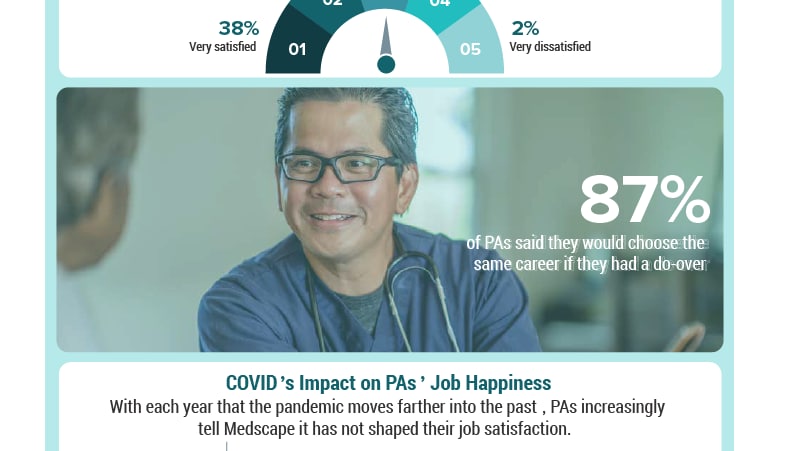Physician Assistants Express High Job Satisfaction Despite Pandemic Challenges
Core Concepts
Physician assistants report high levels of job satisfaction, with most feeling respected by doctors and willing to choose the same career again.
Abstract
This infographic presents the findings of the Medscape Physician Assistant Career Satisfaction Report 2024, which surveyed physician assistants (PAs) about their job satisfaction. The key insights are:
- Around 8 in 10 PAs said they were at least somewhat satisfied with the respect they feel from doctors at work.
- About 7 in 8 PAs said they would choose the same career if they could have a do-over.
- As the COVID-19 pandemic recedes, PAs increasingly report that it has not shaped their job satisfaction.
The infographic highlights several important barometers of satisfaction among PAs, indicating that they are generally content with their careers despite the challenges they may have faced during the pandemic.
Customize Summary
Rewrite with AI
Generate Citations
Translate Source
To Another Language
Generate MindMap
from source content
Visit Source
www.medscape.com
Infographic: PAs Feel Content With Jobs Despite Challenges
Stats
Around 8 in 10 physician assistants said they were at least somewhat satisfied with the respect they feel from doctors at work.
About 7 in 8 physician assistants said they would choose the same career if they could have a do-over.
Quotes
None
Key Insights Distilled From
by Jon at www.medscape.com 07-09-2024
https://www.medscape.com/viewarticle/infographic-pas-feel-content-jobs-despite-challenges-2024a1000cac
Deeper Inquiries
How do the satisfaction levels of physician assistants compare to other healthcare professions?
In comparison to other healthcare professions, physician assistants (PAs) generally report high levels of job satisfaction. According to the Medscape survey, around 8 in 10 PAs expressed satisfaction with the respect they receive from doctors at work. This level of satisfaction is notably higher than what is reported in some other healthcare professions where hierarchies and power differentials may impact job satisfaction. PAs often work closely with physicians, and the positive relationships they have with doctors contribute significantly to their overall job satisfaction levels. Additionally, the autonomy and flexibility that PAs enjoy in their roles also play a role in their high satisfaction levels compared to some other healthcare professions.
What factors, beyond respect from doctors, contribute to the high job satisfaction reported by physician assistants?
While respect from doctors is a significant factor contributing to the high job satisfaction reported by physician assistants, there are other key factors at play as well. Autonomy in decision-making, the ability to work in various specialties, opportunities for career advancement, and a sense of fulfillment from helping patients are all factors that contribute to the overall job satisfaction of PAs. The collaborative nature of the PA role, where they work closely with physicians and other healthcare professionals, also adds to their job satisfaction. Additionally, the work-life balance that many PAs are able to achieve due to their flexible schedules and relatively manageable workloads is another factor that contributes to their high job satisfaction levels.
How might the COVID-19 pandemic have impacted physician assistant job satisfaction in the long term, beyond the immediate effects discussed in the infographic?
While the infographic suggests that the impact of the COVID-19 pandemic on physician assistant job satisfaction is diminishing as time passes, there may still be long-term effects that could influence job satisfaction. The pandemic has brought to light the importance of healthcare workers, including PAs, and the challenges they face in providing care during a crisis. PAs have been on the front lines of the pandemic, dealing with increased workloads, stress, and potential exposure to the virus. These experiences could have lasting effects on their job satisfaction, leading to burnout or a reassessment of their career choices. Additionally, the changes in healthcare delivery and the shift towards telemedicine brought about by the pandemic may have long-term implications for the role of PAs and how they perceive their job satisfaction. It will be important for healthcare organizations to address these potential long-term impacts and provide support to ensure the continued job satisfaction of physician assistants.
0
